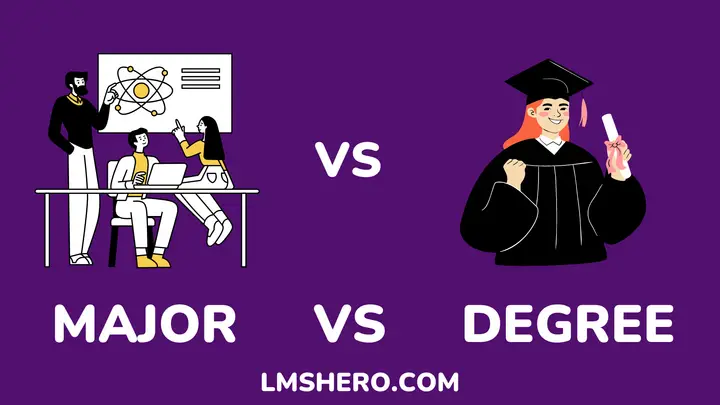As you start your higher education, you’d come across a lot of terms that are used interchangeably, although they do not mean the same thing. Examples are the terms major and degree.
You’ve most likely heard someone say they have a degree in a certain course, while another says they are majoring in a certain field of study. This might make you wonder if the two terms are actually the same or different.
Understanding the actual meaning and differences between a major and a degree is crucial in your academic pursuit and career. This article explains everything you need to know about them.
What is a major in college?
A major is the area of study that you decide to focus on while pursuing your degree. In other words, it is your main area of concentration in your undergraduate education.
To earn a bachelor’s degree, students are required to complete 40 classes. College majors are roughly 12 of the 40 classes. These classes are specifically aligned with the career you want to pursue after graduation.
Essentially, majors serve as the foundation for a student’s upcoming profession. It is combined with your degree to show future employers or graduate programs your area of specialization.
That said, highlighted below are examples of college majors.
Examples of college majors
- Economics
- Psychology
- Electrical engineering
- Computer engineering
- Political science
- English language and literature
- Computer science
- Communications
- Nursing
- Anthropology
- Medicine
- Law
What is a degree in college?

Degrees are academic awards bestowed on students who have fulfilled the requirements for a course of study in college or university. In other words, students who have successfully completed their education in college or university earn a degree.
Students who complete two years of undergraduate studies at a community college are awarded associate degrees while those who complete a four to five academic program in a college or university earn bachelor’s degrees.
Those who decide to continue their studies, first study for a master’s degree, and then a doctorate afterwards.
In terms of discipline, an undergraduate can obtain a bachelor of science, a bachelor of arts, or a bachelor of engineering, depending on their major.
For instance, if you major in civil engineering, you may receive a Bachelor of Engineering in Civil Engineering. The types of bachelor’s degrees by discipline include:
- Bachelor of Science
- Bachelor of Arts
- Bachelor of Fine Arts (B.F.A.)
- Bachelor of Business Administration (B.S.B.A.)
- Bachelor of Engineering (B.Eng.)
- Bachelor of Architecture (B.Arch.)
- Bachelor of Philosophy (B.Phil.)
- Bachelor of Science in Nursing (B.S.N.)
- Bachelor of Science in Public Affairs (B.S.P.A.)
- Bachelor of Social Work (B.S.W.)
What are the four types of degrees by levels?
For better understanding, let us briefly explain the different types of degrees based on educational level.
1. Associate degree
This is the academic equivalent of two to three years in a college. It is higher than a high school diploma but lower than a bachelor’s degree.
Majors in associate degrees are a bit broader and not as streamlined as bachelor’s degrees. Thus, an associate can help you understand the general scope of a course in preparation for a four-year degree program.
2. Bachelor’s degree
It is a degree obtained after 4 to 5 years of study. The four-year academic program consists of 120 credit hours which students must complete to earn their bachelor’s degree.
Under a bachelor’s academic program, 60 credits are required for general courses, 30 to 36 credits for majors, 18 to 21 credits for electives, and 18 to 30 credits for minors.
3. Master’s degree
After completing a bachelor’s degree, you may decide to continue your studies. The master’s program is the first advanced study program for graduates.
It takes one to two years to complete often with the requirement of a thesis. A master’s program helps you gain more expertise and knowledge in a field of study.
A master’s program could be an extension of your undergraduate majors or an opportunity to go into a completely different field entirely. The category of master’s degree by discipline includes:
- Masters of Science (MSc)
- Master of Arts (MA)
- Masters of Philosophy (MPhil)
- Masters of Research (MRes)
- Master of Engineering (MEng)
4. Doctoral degree
This is the highest level of academic qualifications for students. In most cases, a doctorate is an advancement for a professional teaching career.
For some, however, it may be for personal fulfillment or to enhance their expertise in a non-academic career. To earn a Ph.D., students must write a dissertation.
Key differences between a degree and a major
With majors and degrees defined in detail, you should already know the difference. Nevertheless, here is a breakdown of the differences for more simplicity and clarity.
1. Status
The major difference between a major and a degree is the award of completion which states your qualifications.
While both states your area of specialization, degrees demonstrate that you have successfully met the requirements for a course of study as deemed fit by the university or college.
So, degrees are academic ranks. Having a degree means that the academic institution recognizes that you have sufficient skills and knowledge to practice as a professional in your field.
With your degree employers can identify what field or job roles you can be hired for. On the other hand, a major is a specialized field of study under a degree program.
It doesn’t come with any form of award. Rather it tells people what area of study you focus on as an undergraduate.
2. Credits
Typically, 120 credits are required to complete a bachelor’s degree. These credits include major and non-major courses. Majors account for approximately 30 to 36 hours of the total credits required to graduate.
If you need to speed things up and earn a degree quickly, there are online accelerated courses that focus on majors and less on non-majors. Accelerated courses require can be completed in 2 years.
3. Types
There are various types of degrees depending on your discipline or level. From associate to bachelor’s, master’s, and Ph.D.
There are also different types of majors. It could be a major in mathematics, biochemistry, information technology, business administration, English language and literature, and the like.
4. Focus
To earn a bachelor’s degree, general courses, majors, and electives are required. Some universities require students to take a minor or secondary specialization.
Without combining all of these courses it would be impossible to meet the required course hours to earn a bachelor’s degree.
But, a major is just one part of a bachelor’s program that focuses on your area of study. It is a combination of courses that helps you gain knowledge and expertise in your aspiring career.
5. Time of completion
A bachelor’s degree takes 4 to 5 years to finish. A master’s takes 1 to 2 years while a doctorate can take 3 to 7 years.
The first 2 years of a bachelor’s academic program are dedicated to general courses and preparatory courses. The major comes in at the end of sophomore year or during junior year.
What is degree specialization?
When a college or university offers specializations within a major, allowing students to further focus on a course of study, it is called a degree specialization.
For instance, a student studying electrical engineering may decide to concentrate on telecommunications.
Another case of degree specialization is when colleges allow you to delve into a particular field while maintaining a broad focus.
For example, if a student is interested in accounting but wishes to have other options that allow him or her to pursue a career in business, they can choose a BBA with a specialization in accounting instead of a BSc in accounting.
FAQs
Is a degree higher than a major?
Yes. Degrees are proof of completion of a course of study which includes a major.
What degree is the highest?
A doctorate is the highest level.
What is the difference between a major and a minor?
While a major requires 30 to 36 credit hours, a minor requires 18 to 30 hours.
What is a 3-year degree called?
A 3-year degree is an associate’s degree.
Conclusion
When entering college or university, there are many terms to become familiar with. Degrees and majors are only part of the equation. If you’re not sure what degree or major to pursue, you should probably contact an academic advisor or counselor.
Furthermore, you can try out an associate degree or an online program. These alternatives are cheaper and shorter and can help you identify your interest as you proceed.
Peradventure, if you’re already enrolled in a major that you do not like or seems too difficult, you should consider switching majors to avoid academic probation.
Finally, you may also want to understand the differences between academic GPA and total GPA.
I hope this article helped. Thanks for reading.







